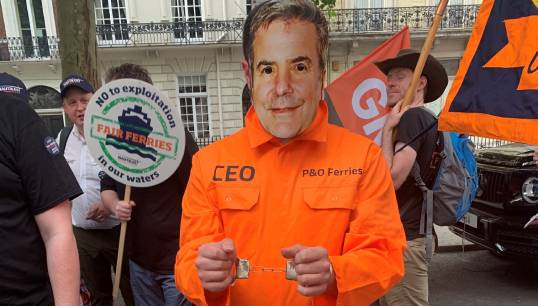
Seafarers from countries including the Philippines who are now working on P&O Ferries’ cross-Channel routes are being paid as little as £4.87 per hour, the company’s chief executive Peter Hebblethwaite confirmed to the House of Commons business and trade committee.
Mr Hebblethwaite admitted to receiving more than £500,000 in compensation last year.
During his appearance to give evidence before the committee, he also reversed his 2022 statement that he would repeat the decision to sack the company's UK seafarer workforce and replace them with agency crew. Instead, after years of bad press, he said that he 'regretted' the decision.
He further revealed that the P&O Ferries will need to revise its crewing model in the face of French legislation, which require ferry operators to pay the national minimum wage and keep crew onboard for no more than 14 days. Agency crew employed via PhilCrew have been found by journalists at ITV and the Guardian to be working 12-hour shifts, seven days a week, for up to 17 weeks at a time without a day off.
Similar UK legislation is expected to come into force this summer, which Nautilus International argues is still not enough to prevent abuses.
Nautilus International general secretary Mark Dickinson and RMT union general secretary Mick Lynch wrote to the committee ahead of the scheduled evidence session, informing MPs about the company's shameful practices on pay.
Mr Dickinson also spoke at a Parliamentary event on 30 April on the subject of P&O Ferries, attended by key members of the Labour Party including shadow maritime and aviation minister Mike Kane and shadow employment rights minister Justin Madders.
He called for Labour to be bold in their ambition on a mandatory seafarers welfare charter to stop employers from mistreating seafarers.
'A potential Labour government must send a clear message that we will not tolerate any form of exploitation in our waters, and they will enforce local standards that our people expect, not international minimums that were never designed for these types of trade,' he said.
Tags
More articles
Nautilus makes the voice of seafarers heard at P&O Ferries seminar in Parliament
UK should prioritise RFA pay and challenges before committing to further defence spending
Nautilus International, the UK’s largest maritime union, has criticised the government for committing to increasing defence spending while refusing to move on pay for Royal Fleet Auxiliary (RFA) employees.
